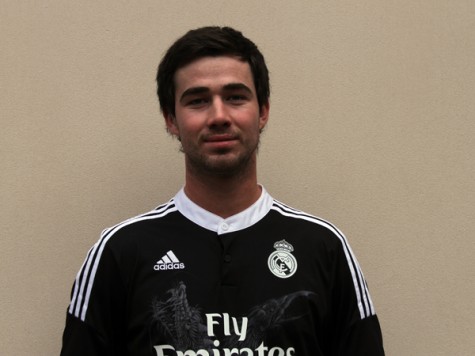Former Vaquero Alonzo Gonzalez, now a pitcher for the Toronto Blue Jays’ professional baseball team, said his year at Glendale College helped him get his baseball career back on track. Gonzalez, 23, stopped by Stengel Field last week to pitch to Vaquero hitters and chat with head baseball coach Chris Cicuto before heading to spring training.
“He’s really been a major influence on my development as a baseball player and a man. That whole staff really — those guys are a part of my family and I know that they know that,” Gonzalez said.
Cicuto saw Gonzalez pitch at Santa Monica High School as a highly touted recruit. Gonzalez’s 6’5 frame and high 80’s fastball attracted the eyes of top notch programs, including UCLA, Loyola Marymount, Long Beach State, and Cal State Fullerton.
After committing to LMU, he had a rough year, battling injuries and struggling in some of his classes. This forced him to redshirt, which is to save another year of eligibility in college in exchange for sitting out the athletic year. Gonzales said he took the setback in stride.
“I’ve always known that I’d be a big leaguer. It’s been my dream since I was little. I’ve never had a backup plan,” he said.
Cicuto jumped at the chance to recruit Gonzalez.
“I knew that Alonzo had huge upside as a baseball player. When I heard he was leaving LMU, I had him come to campus three times during the summer to talk about attending GCC. Even when he told me he was going to another [junior college, I called and told him he didn’t want to do that. I told him he needed to be at Glendale, not because of the baseball, but for the entire experience,” Cicuto said.
“[Gonzalez] is one of my favorite players and stories to share with others, because he has had a very challenging life. But he his so strong minded that he never let anything beat him,” the coach said. “I’d like to say going to GCC helped him find himself as a young adult. He is a true Vaq!”
Gonzalez played for GCC during the 2011-2012 academic year. He had to take a string of buses to get to campus every day from Santa Monica for the fall semester.
“Guys looked up to him whether he wanted it or not, because of his talent and experience at a program like LMU. He had big shoes to fill, from being a knucklehead freshman at LMU to a dude at junior college,” Cicuto said. In baseball terminology, a “dude” is a player who merits respect due to his ability to always be prepared and to perform at peak level.
Humbled by his first year in college, Gonzalez said the junior college level is a time for student athletes to give it all they’ve got since there’s no reassurance. This mentality didn’t slip by Cicuto.
“He always, always worked hard,” Cicuto said. “It took a while for him to trust the coaching staff and his team.”
Cicuto said Gonzalez’s performance really took off in the second half of the season. His improvement led to strong interest from many Major League teams, with the Blue Jays taking him in the 18th round.
Since then, Gonzalez has spent his 20s grinding in the minors — Rookie and Single A ball leagues. The minor leagues are Major League affiliate teams of prospects developing their skills in hopes of making a Major League team. Rookie and Single A ball are the lowest levels, while Double A and Triple A are the top levels of the minors, consisting of the players closest to seeing time on a Major League ball club.
Minor League baseball is notorious for difficult and lowest paying jobs. Players drafted in the first few rounds usually are offered enough money to live comfortably in their contract or signing bonus. Those drafted in the mid-to-later rounds, such as Gonzalez, earn median pay below federal minimum wage.
“The pay is the pay, not much more we can do about that,” Gonzalez said.
After spending two years in the minors, Gonzalez has a good feel for the clubhouse in A-ball. He knows he has a ways to go but preaches a strong mentality.
“I’m in a really good position this year to make a major push,” he said. “I’m blessed it can be with the Blue Jays. The biggest thing [for me] is to control what what [I] can control–to go out there day in and day out, grind it out with your brothers and do your job,” said Gonzalez.
While there is a sense of family with his teammates in pro ball, Gonzalez feels like it is still a job. At the junior college level, including at Glendale, “guys play for the team, not for the paycheck.”
“Off the field struggle is just missing my family really. Not having them around is hard, but they understand that I’m doing it for them,” he said. Moving up in the minors will mean more struggles, he said, because “the level of competition is that much more and the stress will be higher because as a collective group, we’re closer to our dreams.”


